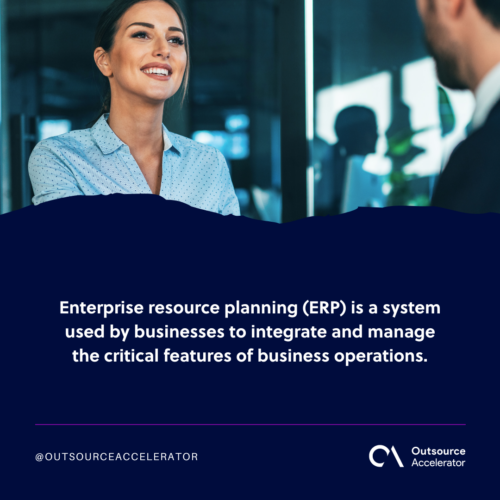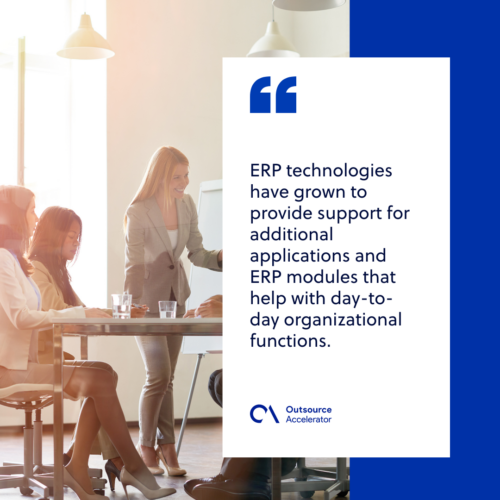Enterprise resource planning (ERP)
Definition
What is enterprise resource planning (ERP)?
Enterprise resource planning (ERP) is a system used by businesses to integrate and manage the critical features of business operations.
An enterprise resource planning system may cover planning, inventory purchasing, sales, marketing, finance, and human resources.
With an ERP system, individual departments can interact and exchange information with the rest of the company more easily. It collects information on the activity and status of several divisions and makes it available to other areas where it may be successfully applied.

How does an ERP system work?
The primary focus of an enterprise resource planning system is to improve organizational efficiency by monitoring and improving how corporate resources are being used.
ERP systems usually include all areas of corporate operations and include an integrated system, a shared database, real-time operation, and support for all components. It also provides a centralized user experience for all applications, whether on-premise, cloud-based, or SaaS-hosted.
In addition, enterprise resource planning systems may gather and compare metrics across departments and generate various reports based on roles or particular user requests.
The data collected allows for faster data discovery and reporting, as well as a comprehensive perspective of business performance with detailed insights into how resources are allocated.
Enterprise resource planning synchronizes reporting and automation by eliminating the requirement for various databases and spreadsheets that would otherwise have to be manually integrated to create reports.
This combination of data collecting and reporting provides useful knowledge, such as where to decrease expenses and improve operations, allowing for real-time business choices.
Why is ERP important for businesses?
Enterprise resource planning systems have become essential for firms trying to make the most of their resources. ERP can help executives reallocate sources of financing and develop more effective procedures that save money without losing quality or performance.
An ERP system is also helpful for planning and coordination. Employees may view detailed information about current available inventory and client orders, as well as compare supplier purchase orders and predict future demand.
In addition, they can make changes to avoid difficulties if required. Enterprise resource planning software also promotes communication and collaboration by allowing employees to check on the state of other departments.
An ERP system, as a comprehensive source of data, also delivers various reports and analytics that may make or break a corporation.
An enterprise resource planning function that executives value is converting a massive amount of data into charts and graphs that clearly depict patterns and assist future model outcomes.
What industries can benefit from ERP?
Enterprise resource planning software may help businesses become more efficient in any industry. It is a useful communication tool for managing internal and external departments.
Enterprise resource planning also helps with day-to-day duties such as project management, tracking adherence to requirements, and dealing with the difficulties in running a business.
ERP is used in various sectors, including but not limited to manufacturing, electronics, and technology. Automobiles, aircraft and military, healthcare, pharmaceuticals, and agribusiness are also included.
ERP technologies have grown to provide support for additional applications and ERP modules that help with day-to-day organizational functions.

Benefits of ERP Systems
Here are the key advantages enterprise resource planning delivers:
Cost savings
The most significant value proposition of enterprise resource planning systems is they may save your company in various ways. By automating many simple, repetitive operations, you reduce mistakes and the need to hire new personnel at the same rate as the company grows.
Workflow visibility
Since all workflows and information are in one place, employees with system access may monitor the status of projects and the execution of other business processes critical to their jobs.
This visibility may be crucial to managers and leaders, and it is significantly faster and easier than searching for the appropriate documents and asking coworkers for improvements.
Regulatory compliance & data security
Financial reporting requirements and governmental and industry-specific data security rules change regularly, and an ERP system may assist in security and compliance.
An ERP offers an audit trail by documenting each transaction’s lifespan, including adherence to mandatory approval protocols. Automation can also help businesses decrease the chances of errors and related regulatory issues.
Enterprise resource planning software generates financial reports that correspond to standards and laws, and SaaS products are well-suited to assist businesses with PCI-DSS compliance.
Risk management
In some ways, the ERP system lowers risk. Financial controls may be strengthened and fraud reduced through granular access control and established approval protocols. Also, more precise data minimizes the risk of missed sales or fines.
Employees can quickly handle risks created by business disruptions when they can observe the state of the entire operation.







 Independent
Independent




